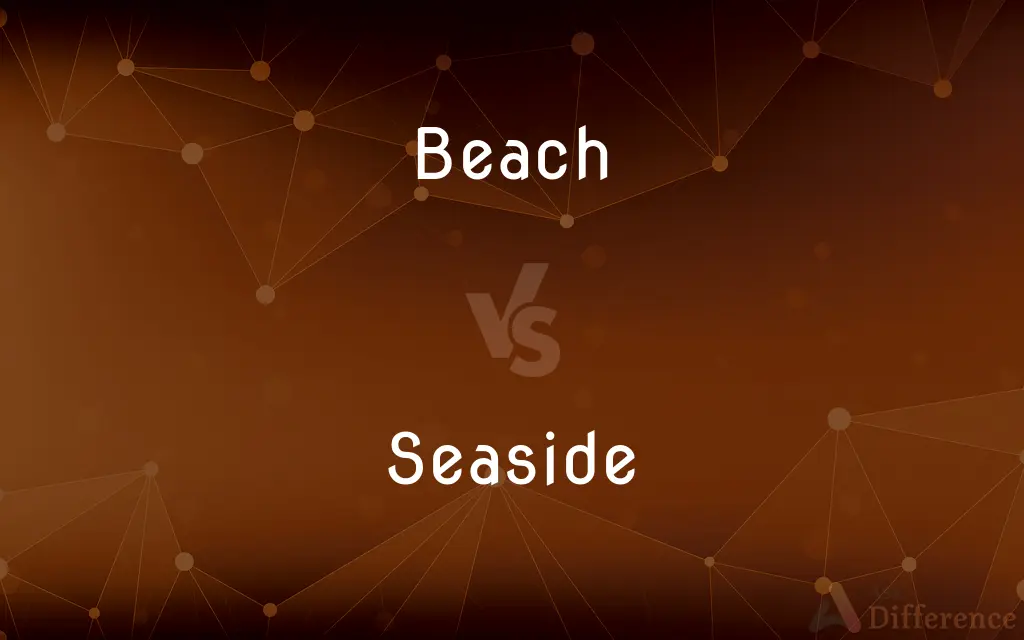Beach vs. Seaside — What's the Difference?
Edited by Tayyaba Rehman — By Fiza Rafique — Updated on February 23, 2024
A beach is a narrow strip of land along the water's edge, while seaside refers to the broader coastal area, including beaches and nearby land.

Difference Between Beach and Seaside
Table of Contents
ADVERTISEMENT
Key Differences
A beach is specifically the sandy, pebbly, or rocky shore along the edge of a sea or lake, often characterized by its recreational use for sunbathing, swimming, and other activities. The seaside, on the other hand, encompasses not only the beach itself but also the broader area adjacent to the sea, including towns, cliffs, and natural landscapes. This distinction highlights the beach as a part of the seaside's larger ecosystem.
The physical characteristics of beaches and seaside areas vary significantly. Beaches are defined by their loose surface materials, such as sand, pebbles, or rocks, shaped by the action of waves and tides. Seaside areas may include these beaches as well as other coastal features like dunes, cliffs, promenades, and coastal communities, offering a wider range of natural and human-made attractions.
Recreational opportunities also differ between beaches and seaside areas. While beaches are primarily known for water-based activities, the seaside offers a broader range of leisure options, including dining, shopping, and sightseeing in nearby coastal towns, walking along scenic cliffs, and exploring local wildlife and nature reserves.
The ecological importance of both beaches and seaside areas is profound, but they play different roles. Beaches serve as crucial habitats for marine and shore life, acting as breeding grounds and shelters for various species. Seaside areas, encompassing both aquatic and terrestrial ecosystems, offer a broader biodiversity and are vital for environmental conservation efforts.
Cultural and economic impacts distinguish beaches from the broader seaside areas as well. Beaches often symbolize relaxation and vacation culture, attracting tourists seeking leisure and entertainment. Seaside areas contribute more broadly to the local economy, including tourism, fishing, and maritime industries, and are integral to the cultural and social fabric of coastal communities.
ADVERTISEMENT
Comparison Chart
Definition
Narrow land strip along water's edge
Broad coastal area including beaches and nearby land
Physical Characteristics
Sand, pebbles, rocks
Beaches, cliffs, towns, dunes
Recreational Opportunities
Sunbathing, swimming, beach games
Dining, shopping, sightseeing, nature walks
Ecological Importance
Habitat for marine and shore life
Biodiversity across aquatic and terrestrial ecosystems
Cultural/Economic Impact
Symbolizes leisure and vacation culture
Supports tourism, fishing, maritime industries
Compare with Definitions
Beach
The loose pebbles of the seashore, especially worn by waves; shingle.
Seaside
The area along the coast.
They rented a cottage by the seaside for the summer.
Beach
Popular for swimming and sunbathing.
The beach was crowded with vacationers.
Seaside
Important for biodiversity.
The seaside marshlands are a birdwatcher's paradise.
Beach
Often part of larger seaside areas.
The hotel offers a stunning view of the beach and beyond.
Seaside
Offers a variety of recreational activities.
Seaside resorts often have entertainment for the whole family.
Beach
The shore of a body of water, especially when sandy or pebbly.
Seaside
Economic and cultural significance.
The seaside festival celebrates local maritime heritage.
Beach
A horizontal strip of land, usually sandy, adjoining water.
Seaside
Includes beaches, cliffs, and towns.
The seaside town thrives on tourism.
Beach
The shore of the sea, or of a lake, which is washed by the waves; especially, a sandy or pebbly shore; the strand.
Seaside
The area by and around the sea; including the beach, promenade or cliffs
This summer, I'm going to the seaside at Weymouth - I'm very excited about it!
Beach
A sandy or pebbly shore.
They spent the day sunbathing on the beach.
Seaside
The shore of a sea or ocean regarded as a resort
Beach
Subject to tides and waves.
The beach looks different at high tide.
Seaside
The seashore.
Beach
A pebbly or sandy shore, especially by the sea between high- and low-water marks
Fabulous sandy beaches
Seaside
Related to a seaside.
Beach
Pebbles, collectively; shingle.
Beach
An area of sand sloping down to the water of a sea or lake
Beach
Can be found along seas, lakes.
The lake's beach is a popular picnic spot.
Beach
A beach is a landform alongside a body of water which consists of loose particles. The particles composing a beach are typically made from rock, such as sand, gravel, shingle, pebbles, etc., or biological sources, such as mollusc shells or coralline algae.
Beach
The sand or pebbles on a shore.
Beach
The zone above the water line at a shore of a body of water, marked by an accumulation of sand, stone, or gravel that has been deposited by the tide or waves.
Beach
To run, haul, or bring ashore
Beached the rowboat in front of the cabin.
Hooked a big bluefish but was unable to beach it.
Beach
The shore of a body of water, especially when sandy or pebbly.
Beach
To run or drive (as a vessel or a boat) upon a beach; to strand; as, to beach a ship.
Beach
Land on a beach;
The ship beached near the port
Common Curiosities
Can a seaside exist without a beach?
Yes, some seaside areas may have rocky coasts or cliffs instead of sandy beaches.
What activities are common in seaside areas?
Besides beach activities, seaside areas offer dining, shopping, sightseeing, and nature exploration.
Why are beaches important ecologically?
Beaches are crucial habitats for many marine and shore species and act as natural barriers protecting inland areas.
What is the main difference between a beach and the seaside?
The beach is the shore part of the seaside, which includes the broader coastal region.
How do seaside areas impact the local economy?
Seaside areas boost the economy through tourism, fishing, and maritime industries.
Can beaches be artificially created?
Yes, artificial beaches can be created in coastal areas lacking natural sandy shores.
Are beaches always sandy?
No, beaches can also be pebbly, rocky, or covered with shells.
Is it common for seaside towns to be tourist destinations?
Yes, the natural beauty and recreational options make seaside towns popular tourist spots.
What role do beaches play in coastal protection?
Beaches act as buffers against erosion and storm surges, protecting inland areas.
How does tourism affect seaside areas?
Tourism can provide economic benefits but also pose challenges like environmental degradation if not managed sustainably.
How do beaches form?
Beaches form from the accumulation of sand, pebbles, and rocks deposited by waves and tides.
Can the term "seaside" refer to the entire coastal region?
Yes, "seaside" encompasses the whole coastal area adjacent to the sea, including its natural and human-made features.
Do all beaches allow swimming?
Not all beaches are safe for swimming due to strong currents, pollution, or other hazards.
What measures are taken to preserve seaside areas?
Measures include environmental protection laws, sustainable tourism practices, and conservation programs.
Are seaside areas protected by law?
Many seaside areas are protected for their environmental, cultural, and economic importance through conservation efforts and regulations.
Share Your Discovery

Previous Comparison
Offer vs. Acceptance
Next Comparison
Labourer vs. LabourAuthor Spotlight
Written by
Fiza RafiqueFiza Rafique is a skilled content writer at AskDifference.com, where she meticulously refines and enhances written pieces. Drawing from her vast editorial expertise, Fiza ensures clarity, accuracy, and precision in every article. Passionate about language, she continually seeks to elevate the quality of content for readers worldwide.
Edited by
Tayyaba RehmanTayyaba Rehman is a distinguished writer, currently serving as a primary contributor to askdifference.com. As a researcher in semantics and etymology, Tayyaba's passion for the complexity of languages and their distinctions has found a perfect home on the platform. Tayyaba delves into the intricacies of language, distinguishing between commonly confused words and phrases, thereby providing clarity for readers worldwide.














































